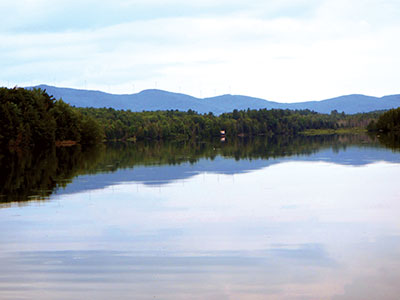For the leaders of the Group for the Advancement of Psychiatry (GAP), in-person, biannual meetings are critical to the organization’s work as a think tank with a goal of advancing psychiatric practice. Yet GAP also responds to the current problems facing psychiatry and society at large, including climate change. The group has wrestled with the fact that having members travel to twice-yearly meetings from across the country adds a significant amount of carbon into the atmosphere.
GAP’s Climate Committee, established by John Looney, M.D., during his presidency, has investigated the carbon footprint that such meetings have had and considered how to optimize mental health care while balancing the needs of the planet. Looney volunteered to tackle the challenge of raising GAP’s sustainability head on.
Most of GAP’s members live on the east coast, and it meets in White Plains, N.Y. Initial efforts focused on encouraging members to share rides to the meeting or take the train, Looney explained. The organization works with its hotel to encourage green practices, such as not providing plastic water bottles. It also encourages members to try vegetarian meals at the hotel, as meat production produces a significant amount of greenhouse gas emissions.
“But the biggest issue, to me, is carbon renewal,” said Looney. “How can we take carbon out of the atmosphere and make up for the third of our members who are traveling from the west coast or middle America?”
Looney created the GAP forest, which consists of donated forestland, though no property actually changes hands. Rather, forestland owners donate the carbon sequestration from their forests to GAP. The business world has been following this practice for years, with corporations buying carbon credits from private forest owners to offset their carbon emissions. It’s estimated that an acre of forest can absorb as much as 40 tons of carbon dioxide from the atmosphere.
Looney has donated the sequestered carbon from his 533-acre mature hardwood forest on the Cumberland Plateau in Tennessee. Doug Kramer, M.D., donated the sequestered carbon from his 64 acres of Vermont forestland. GAP has also accumulated donated sequestered carbon from forests in North Carolina and India. Looney said he is working with owners of land in southern Texas who are interested in donating the sequestered carbon from their land covered in prickly pear cacti.
Steven Sharfstein, M.D., M.P.A., a former APA president and GAP president, said he had not known about carbon sequestration until Looney explained how it works. “I think it’s an excellent way for us to give back as an organization,” he said. “The climate crisis has profound implications for mental health. It’s changing our lives every day.”
Right now, the GAP forest sequesters 10 times the amount of carbon that GAP members are estimated to create when they travel to the organization’s meetings, Looney said. But he is hoping the forest continues to grow with new trees. “If the GAP forest could get big enough, we could change the name to the American Psychiatric Forest and share it with other organizations,” he said. “That’s our goal.”
The organization took money out of its reserves and worked with a nonprofit group to plant 5,000 trees in eastern Tennessee and West Virginia. The trees were planted in areas where the land needed to be reclaimed due to damage from strip mining. “Next year we will plant again, maybe even going to the Amazon rainforest because there is a nonprofit organization we can work with down there who can plant them for us,” Looney said.
“We are delighted at the ways GAP leadership has embraced addressing the organization’s emissions as critical to its ethical function in the wake of the Climate Committee’s work on sustainable conferences,” said GAP’s Climate Committee Co-Chairs Janet Lewis, M.D., and Elizabeth Haase, M.D. “Our hope is that the organization will soon become fully sustainable in its operations.”
The links between climate change and mental health are numerous. Current GAP President Calvin Sumner, M.D., explained that, while not everyone’s mental health will be severely impacted by climate change, it has a population-level effect.
“Especially for people who are already vulnerable to developing a mental illness due to hereditary reasons or their past experiences, the environment is critically important for maintaining their stability,” he said. “When you have broad disruptions to the environment, as we have with climate change, it puts stress on everyone, including individuals and the mental health care system in general.”
Anxiety related to climate change is incredibly common, especially among young people, Looney pointed out. “They worry about it relentlessly. They wonder if there is going to be a livable world for them when they grow up,” he said. He pointed out that psychiatry patients are often told to think about the future. If patients stop using illicit drugs or they get treatment for their illnesses, their lives will be better in the future.
“That’s exactly the kind of thinking we need to generate in the world,” he said. “What we shouldn’t do is sit around and catastrophize and say the end of the world is coming. What we need to think is: What can we do about it?” ■

